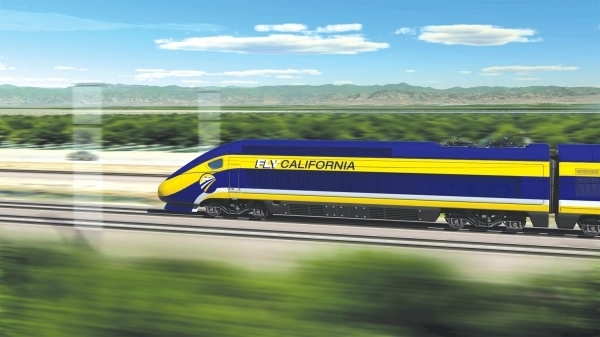As the California High-Speed Rail Authority prepares to release its long-awaited business plan next month, legislators and high-speed rail critics are gearing up for a heated debate over the rising costs of the controversial project.
The project, for which state voters approved a $9.95 billion bond in 2008, has seen its price tag escalate from about $33 billion to more than $44 billion a year after the vote. State analysts and high-speed rail watchdogs expect the cost estimate to be greater than $60 billion in the business plan, which the rail authority is scheduled to release in October.
The latest shot at the rail authority's projections came Monday, when three Peninsula financial experts released a detailed report arguing that the project's cost will greatly exceed the agency's estimates. The report, co-authored by Stanford University Professor Emeritus Alain Enthoven, William Grindley and William Warren, relies on recently released details about the projected costs of the rail line's Central Valley segment and the apparent lack of interest from private investors to argue that without many billions in additional funding, the rail project remains an "impossible goal" for the cash-strapped state.
The authors say they don't oppose high-speed rail in concept and note that it seems to work in other parts of the world. But they also write that California voters approved the project based on the promise in Proposition 1A that the rail line would not require additional investment from the state. The rail authority was aiming to pay for the line through a combination of state funding, federal grants and private investments.
"After months of work on this report, six other reports, a complete financial analysis and 20-plus notes, we are forced to conclude that the Authority's promise is an impossible goal," the authors write in the 67-page report.
The authors also claim the rail authority's projection of receiving up to $19 billion in federal grants is highly unrealistic. So far, the rail project has received about $3.3 billion, and the Republican majority in the U.S. House of Representatives has been vehemently opposing major new grants for high-speed rail.
Given the lack of certainty over federal funding, the three authors of the report argue that it's time for state officials to reconsider the project. It seems prudent, the report states, "to cut the State's losses until there is a clear demonstration of both full financial resources for construction -- as well as proof of the system's operating financial sustainability."
"With highly questionable prospects for Federal grants to private 'at risk' construction funds, but certainty that costs will continue to increase, the logic for continuing the largest project in California history is highly questionable," the report states.
The report's prediction that the cost of the project will continue to rise sharply echoes similar findings from the Palo Alto-based group Californians Advocating Responsible Rail Design, which used the rail authority's documents to come up with its own estimate. The group projected in February that the rail line would cost more than $60 billion. The nonpartisan Legislative Analyst's Office released a report in May pegging the price tag of the line at about $67 billion.
The rail authority has not released a revised cost project since 2009, when its business plan estimated that the rail line would cost about $44 billion. But rail officials expect the price tag to go up in the new business plan, Rachel Wall, a rail authority spokeswoman, said after the Legislative Analyst's Office report was released.
The revised business plan is already generating great anticipation in Palo Alto, where residents and elected officials have long questioned the rail authority's projections. Assemblyman Rich Gordon, D-Menlo Park, who is chairing a subcommittee charged with reviewing the business plan, said last week that he plans to hold a public hearing on the new document in Palo Alto.
Gordon, who had a joint meeting with the City Council last week, called the financing of the project "exceedingly problematic" and said he expects the business plan to generate "fairly robust debate" over the rail authority's financial and ridership assumptions.
"Hopefully, this will get us to a point of understanding what should be our course forward in California," Gordon said.



Comments
Menlo Park
on Sep 19, 2011 at 8:07 pm
on Sep 19, 2011 at 8:07 pm
So, here's this chart. One line, the cost line, keeps going upward. The other line, the ridership line, keeps going downward.
At what point do you suppose, legislators like Assemblyman Gordon, State Senators Simitian and Lowenthal, and our Congressional representatives, Eshoo and Speier, will say stop. That's far enough. There's not enough ridership and the costs are far too high. It is insane to continue this project.
Furthermore, the federal government will never provide more than a seed-money pittance.
The major cost burden will fall directly on California. Will this train ever produce revenue?
That is extremely unlikely. To the contrary. The Grindley group projects annual operating cost losses in excess of $4 billion annually.
Are we not yet at that point where what we are watching being built is not unlike Saddam Hussein's many marble palaces?
Crescent Park
on Sep 20, 2011 at 2:42 am
on Sep 20, 2011 at 2:42 am
The Weekly urged people to vote in favor of HSR (Web Link I suspect they still favor it, but realize that most residents oppose it, so the Weekly keeps its opinions to itself.
Adobe-Meadow
on Sep 21, 2011 at 10:30 am
on Sep 21, 2011 at 10:30 am
It's a little insane that Joe Simitian is a wholehearted supported of the project. He's crazy. He certainly does not represent my interests.